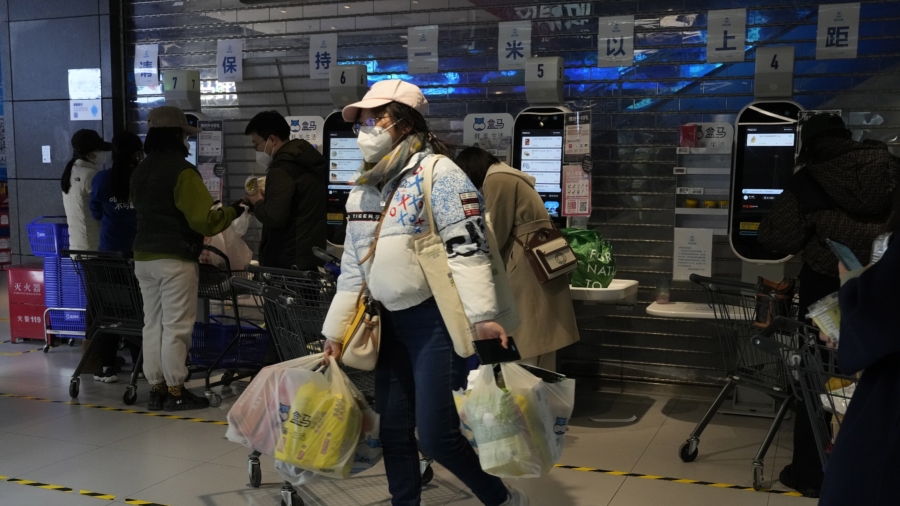BEIJING—Residents of some parts of China’s capital were emptying supermarket shelves and overwhelming delivery apps Friday as the city government ordered faster construction of COVID-19 quarantine centers and field hospitals.
Uncertainty and scattered, unconfirmed reports of lockdowns in at least some Beijing districts have fueled demand for food and other supplies, something not seen in the city for months.
Unusually large numbers of shoppers in the city’s northern suburbs left shelves bare in markets, but customers were relatively few in the center of the city of 21 million, where supplies remained abundant.
Daily cases of COVID-19 across the country are hitting records, with 32,695 reported Friday. Of those, 1,860 were in Beijing, the majority of them asymptomatic.
The actual number of COVID-19 cases may be much higher. China’s COVID-19 data is difficult to verify, as the Chinese regime routinely suppresses or alters information.
Improvised quarantine centers and field hospitals hastily thrown up in gymnasiums, exhibition centers, and other large, open indoor spaces have become notorious for overcrowding, poor sanitation, scarce food supplies and lights that stay on 24 hours.
Most residents of the city have already been advised not to leave their compounds, some of which are being fenced in. At entrances, workers clad head to toe in white hazmat suits stop unauthorized people and make sure residents show a recent negative COVID-19 test result on their cellphone health apps to gain entry.
Several university campuses have been closed off and students in lower grades have been shifted to online classes.
Meanwhile, some of Beijing’s grocery delivery services have reached capacity.
An increase in demand combined with a worker shortage left some customers unable to book same-day delivery slots on Friday for food and supplies from popular online grocery services such as Alibaba’s Freshippo and Meituan Maicai.
Online, some Chinese users said some delivery personnel were unable to work because their compounds were locked down. The reports could not be verified.
Alibaba did not immediately comment.
At a Friday afternoon news conference, city government spokesperson Xu Hejian said it was necessary “to strengthen the management and service guarantee” of quarantine centers and field hospitals where people who test positive for COVID-19 or have been in close contact with an infected person are taken by police.
Officials have in recent days repeatedly insisted that China must stick with its hard-line “zero-COVID” policy that mandates lockdowns, mass testing, and quarantines for anyone suspected of having come into contact with the virus. The policy is seen as taking a harsh toll on the economy and upending lives in many Chinese cities, leading the World Health Organization and others to call for a change in tack—calls the ruling Chinese Communist Party (CCP) has angrily rejected.
Harsher measures have been enacted in many other parts of China. Local officials are under intense pressure to prevent outbreaks and often gravitate toward the most extreme measures.
Guangzhou suspended access Monday to its Baiyun district of 3.7 million residents, while residents of some areas of Shijiazhuang, a city of 11 million people southwest of Beijing, were told to stay home while mass testing is conducted.
Also Friday, Beijing cut the amount of reserves that banks are required to hold in a move that will help lenders comply with orders to defer repayments by companies that are struggling because of increasing anti-virus controls.
The amount of their deposits that banks are required to leave with the People’s Bank of China will be cut by 0.25 percentage point to an average of 7.8 percent, the central bank announced. It didn’t mention virus controls and said the cut would “consolidate the upward basis for economic stability.”
Private economists and the International Monetary Fund have trimmed already low forecasts of China’s annual economic growth as the Chinese regime closes shops and offices and tightens controls on manufacturing.

